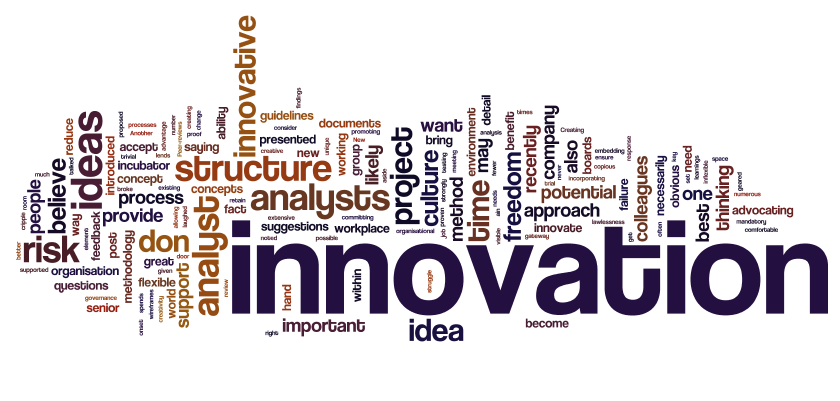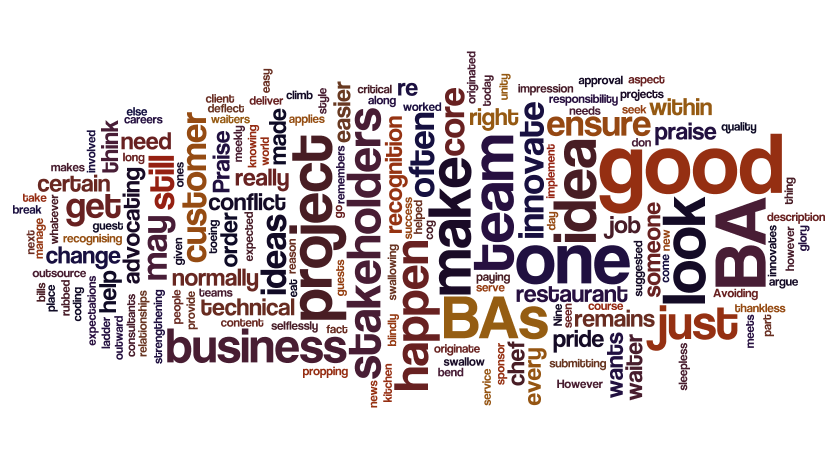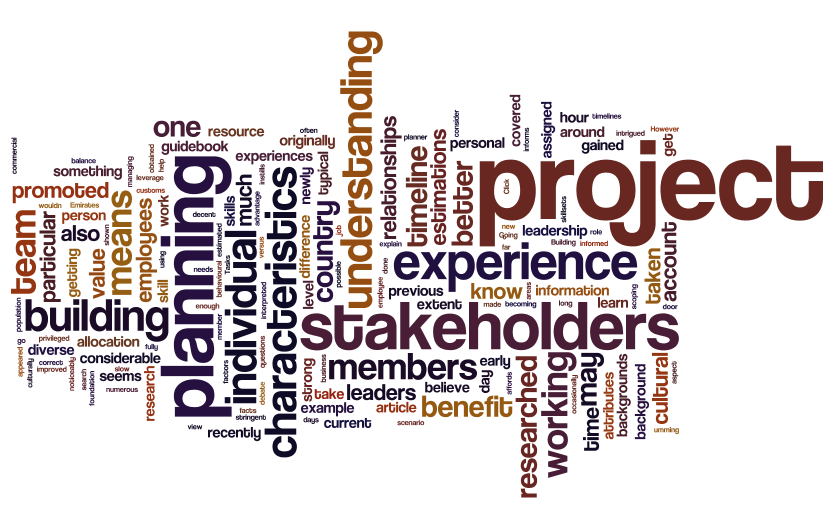Posted on 21, July 2011
in Category practitioner experience
Something rings true about the age old saying, “if it ain’t broke, don’t fix it.” If a process is working, why change it, right? Wrong! As Bob Dylan rightly said: “The times they are a-changin’.” Our world is continually evolving and long-standing methodologies and techniques don’t necessarily provide the benefit that they once did. Similarly, the world of organisational strategy is shifting. This shift calls for innovation which will allow businesses to retain their competitive advantage. Innovation requires support In response to my last post, “The best methodology is freedom“, I have had a number of questions around how a [&hellip
Read More
Posted on 21, July 2011
in Category career development
How to manage BA careers beyond the 5 year itch. Presented at an IIBA UK evening event in July
Read More
Posted on 14, July 2011
in Category practitioner experience
I was sitting with my wife the other day, enjoying a bright summer’s afternoon and having a bit of a chat. We were discussing our experiences during interviews, and chuckling about certain questions that inevitably get bandied around during the process (yes, we are nerds!). One question that always pops up is about teamwork: are you a team player, etc, etc. Now we both like to think of ourselves as efficient individuals, people who get things done. Hence we were amusing ourselves by hypothesising at how an interviewer would react if one of us said during an interview that I [&hellip
Read More
Posted on 16, June 2011
in Category practitioner experience
There have been bounteous discussions around the need for new life to be breathed into business analysis methodologies. I have chosen to stay away from the agile versus scrum versus waterfall versus iterative versus I-don’t-care debate. I was always of the opinion that these discussions were intuitive and unnecessary. I was wrong. Business is changing. So is business analysis. Almost every article surrounding business today makes mention of the changing business world. Specific emphasis is placed on the doom that organisations face if they don’t adapt with the changing times. Cue the enormous gulp of fear. Given that a large [&hellip
Read More
Posted on 8, June 2011
in Category practitioner experience
Is your BA style to go for glory? Do you seek praise around every bend? Do you want to be seen, heard and acknowledged? Do you vigorously voice your ideas and take all the credit? In today’s cutthroat business world I do not blame you if you do; often when one is at the project buffet it’s eat or be eaten. But I would like to argue that being a BA is about swallowing one’s pride – it’s about propping up your business and technical stakeholders, it’s about just being content with knowing that you helped make it all happen. Do [&hellip
Read More
Posted on 23, May 2011
in Category practitioner experience
During the past few days my curiosity-muscle has been tickled by the dormant value that resides in understanding stakeholder backgrounds early on in a project. Of particular interest is how this relates back to project timeline estimations and planning. “How?” you ask. Allow me to explain… I wouldn’t expect much “umming and ahhing” if I alleged that there was considerable value to be gained in building strong relationships with stakeholders. It seems almost logical that building robust connections brings with it not only commercial benefit, but also project benefit. It instills a sense of teamwork as opposed to the typical [&hellip
Read More
Posted on 27, April 2011
in Category practitioner experience
Picture this if you will: It’s a Monday morning after a long weekend where you took Friday off to get out of the city. You were consequently out of 3G coverage which resulted in no mobile phone reception, and therefore no email access. Back to Monday – you start your email application, and you have 113 unread emails. Do you: panic and hyperventilate, black spots start to appear in your peripheral vision, head straight to the kitchen, coffee will be your only saviour, knuckle down, and start going through the emails in the order you received them, or wish you [&hellip
Read More
Posted on 26, April 2011
in Category practitioner experience
Once upon a time a consulting firm bid for a high profile, fixed price project using Platform A. I realize that I have only started reading this fairytale story but how on earth has this bid included a technology choice when they are yet to do the analysis? The clients were delighted, as were the consulting firm when they won the > 15M contract. “And now for the real work to begin!” declared the (first) Project Manager. The Business Analysts swooped in and worked their magic on high-level design documentation and a long list of prioritized requirements. “Wonderful” declared both [&hellip
Read More
Posted on 21, April 2011
in Category practitioner experience
In today’s fast paced technology world it is common, if not mandatory, for financial institutions to replace legacy systems in order to gain competitive advantage. In my experience business stakeholders will often have decided on the technology before bringing an analyst or consultant on board. A lack of analysis from the onset means uninformed decisions and ultimately reputational risk if the wrong choice is made. Implementation projects that I have been involved in, have typically deferred the engaging of business analysts until project slippage has arisen. I’m not entirely sure whether this is a scapegoat tactic or a sincere attempt [&hellip
Read More
Posted on 30, March 2011
in Category practitioner experience
Politics is a tricky business. When I think of a politician I am reminded of a cowboy trying to herd cattle – they know where they want to take everyone, it’s just rather hard to get everyone to go in their chosen direction. Blood, sweat and tears are involved in the dusty world of influencing people, and all too often, business analysts forget their cowboy hats at home. Human nature inherently means that we want to be heard and have our opinions counted. If our thoughts are not listened to, we tend to feign interest regardless of the outcome. Politicians [&hellip
Read More










